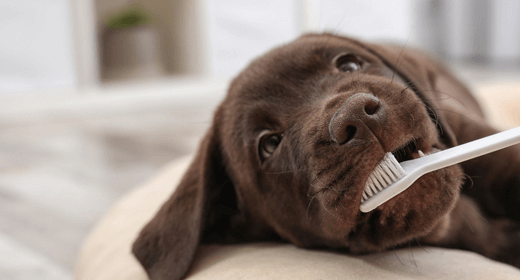

Having a puppy in your household never lets a dull day knock on your door. What could be more exciting than having a fur baby live with you? For some of you, it may also be a lifelong dream finally coming true. While everything about sharing your space with a pup sounds delightful, it starts going south when an untrained puppy takes over the house.
Procrastinating the process of house training a puppy can drive your pooch to eliminate in your house and ruin carpets and furniture. This is not a pretty scenario in the long run because not being able to control your little pup can put you and your family into distress. And most first-time pet parents are clueless regarding how to handle and control their furry companion. If you are one of them, here’s everything you need to do to house train your puppy.
This is not something that you take lightly. You need to be determined and consistent with the process if you want this to stay with your pup forever. House training a dog requires patience and perseverance. Create a puppy house training schedule and stick to it. Try to get your puppy used to walking on leash before you start potty training.
Note: You need to know that your dog is new to your house, it will need time to adjust in the brand-new environment. So, make sure that you do not develop a plan that is too overwhelming for your pet.
A routine always helps in the long run, whether it is for us or for our dogs, establishing a routine will help your dog to understand that there is a specific time to eat, play, sleep, or potty. So, with this, your dog will know that there is a particular time to poop as well. It is better to have a dog with a routine than the one who defecates anytime, anywhere.
Taking your puppy out at appropriate times is non-negotiable. Take it out for a walk right after it wakes up, during its play time, and after it eats or drinks because these are the times when dogs are most likely to want to go. Hence, keep a good gap between meals and water, and bedtime, so your pup does not have to hold their business in for too long.
As a dog parent, you must know that for every month of age, puppies can control its bladder for an hour! So, if your pup is 2 months old, it can hold its bladder for 2 hours. However, 6 hours is the limit. Dogs cannot control their bladder for more than 6 hours.
Commands can help pet parents in communicating with their pooch. If you use a command repeatedly for a certain action, your dog will begin to pick up on the relation between your words and the act. For example, if you keep using the phrase ‘go fetch’ while you throw a toy or a stick, your pet will start understanding that it needs to go and retrieve the object. Similarly, when you take your dog out on a leash and want them to defecate, use the phrase ‘go potty’ and point to a particular spot. This will help them realise that they need to go.
Rewards can help establish a healthy relationship between you and your four-legged friend. These rewards can be in the form of treats or playtime with its favourite toy. It will help you teach new commands while also encouraging good behaviour. Make sure you are not showering treats on your pup before the task or action is complete. For example, give your pooch a treat after it has finished its potty round and not when it is in middle of it. Wondering why? Because then, your pup might not finish what it’s doing and have an accident later inside the house.
Note: If you feel that there's little to no progress, consult your veterinarian to rule out medical issues like bladder infections.
Now that you know how to house train a dog, you must understand that it is a time-consuming process. Your pup might take time to learn, however, with consistent practice, your dog will be obedient. Here are a few things you must know before you two get down to training:
When it comes to potty training, you must know that dogs do best on a thorough schedule. Hence, it is imperative that you make a routine for your dog. If you follow the feeding schedule, your puppy will automatically excrete at fixed times. Use positive potty-training methods to make sure that your puppy is not scared of you.
You can start training potty training your puppies at 12-16 weeks of age. At this stage they can already control their bladder and bowel movements. It takes 4-6 months for a puppy to be potty trained. However, it can even take a year for some dogs. If your dog doesn’t show any progress, please take it to a vet.
The objective of house training is to ensure that your pet poops at the right place.


Puppies grow quickly and have special nutritional needs to keep their bodies strong. The most noticeable period of a pup’s growth phase is known as the rapid growth stage, which occurs between 2 and 6 months of age. From about 3 to 6 months, most pups will lose their puppy teeth. In fact, you might find a tooth near the feeding dish or on the floor, and this is quite normal. However, you may also be left wondering what to feed a teething puppy. This is a perfectly normal query that tends to concern a lot of pet parents.
During the teething phase, the young pup’s mouth and gums may be very sensitive, which could cause them to be a bit picky when it comes to eating. There's nothing you can do except to wait it out, even if their appetite is low for a couple of days.
While teething is painful for puppies, there are a few tips for teething puppy that can make them feel better. Here is a quick guide for you on what to give a teething puppy in terms of food and toys:
Your puppy may seem uninterested in dry food during teething. But don't switch to a new formula to stimulate your puppy's appetite. Changing food at this time can cause additional stress and intestinal upset. The tips below could help your puppy make the change:
Encourage your young dog to chew on toys by choosing chew toys that are appropriate for their size. Also, pick a variety of textures to keep them interested in the toys. You can also try giving them frozen toys that are shaped like a bone. Always keep an eye on the puppies while they are busy chewing the toys, to ensure they don’t bite off chunks. If that happens, do make sure to replace the toy immediately.
You can also give your puppy a clean and damp washcloth, chilled for a few hours. Chewing on this will also provide some much-needed relief. Do ensure that you supervise the puppy while they are chewing on this cloth so that they don’t ingest any sections of it.
Teething is a painful process for the puppies and can cause just as much inconvenience to the owners. Your puppy may lose their appetite and may experience a lot of pain and discomfort. But it is essential to get them through it all while also maintaining their diet. You can consult your vet for any major decisions or choices you make for your puppy during this time - the choice of toys, food, and other soothing methods. You will also have to keep constant vigilance to prevent your little companion from chewing on anything that may harm them, like shoes or the couch. These six months of the teething period may be hard, but you will certainly enjoy seeing them grow through this phase.
In addition to teething, ensuring excellent dental care for your dogs or puppies is of utmost importance. Discover our captivating blog post on dog dental care, and unlock a world of techniques to keep those pearly whites shining bright!